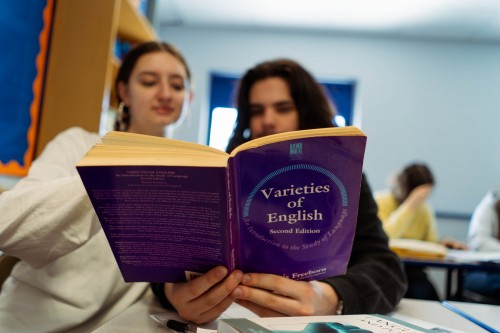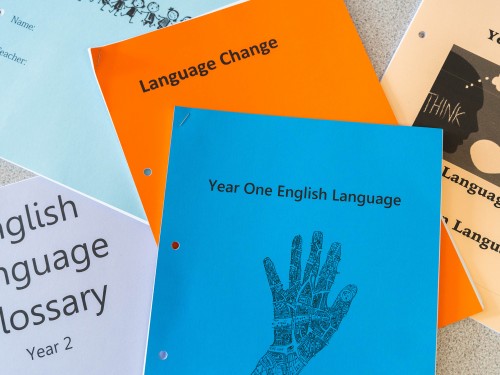Hereford Sixth Form College
English Language
Find a course
English Language A Level
This course explores both spoken and written language in use in a wide range of professionally written texts and transcripts.

English Language
You will investigate many important language issues in society, addressing questions such as:
- How do people use language to assert power?
- Do men and women really speak differently?
- Are men and women presented differently in the media?
- How is technology bringing new words into the language and changing the way in which we communicate?
- How do children learn to speak?
- How and why has language changed from 1600s to present day?
You will develop your own written skills, producing texts for a number of purposes, audiences and genres.
What does the course involve?
You will learn a large amount of technical linguistic terminology in order to analyse how language works.
To prepare you for an unseen texts examination, you will explore a variety of texts, such as transcripts of the spoken word, advertisements, speeches, magazine and newspaper articles, short stories and extracts from novels and plays. You will investigate many important language issues in society.

English Language
The course covers the following examination topics:
Component 1: Language Variation (35%)
How language choices can create personal identities and how language has changed over time.
Component 2: Child Language (20%)
How children acquire language, learn to read and to write.
Component 3: Investigating Language (25%)
A research focus from one area such as:
- Global English.
- Language and gender identity.
- Language and journalism.
- Language and power.
- Regional language variation.
Coursework: Crafting Language (20%)
Two pieces of original writing from the same genre, differentiated by function and/or audience. One commentary reflecting upon the pieces produced.

Trips
Visits to lectures and external events are offered.
Academics and professional journalists also visit throughout the year.
What can you do after the course?
English Language is relevant to all academic and vocational subjects.
You can go on to take a specialist degree in English language, language and communications or linguistics, or other courses such as law, drama, education, history or any of the social sciences.
Career possibilities include journalism, publishing, teaching and speech and language therapy.
I am at university studying Primary Teaching and have found the A Level English Language course extremely useful. Not only is it handy to have the knowledge when sitting in the lectures, but I have an assignment solely on language development - an area we covered in depth on the A Level course. I chose the English Language course by chance, knowing I needed to choose relevant subjects for my university course but didn't realise the positive impact it would have.
Many people, from different colleges, regret not taking the course now, so I am glad I was someone who did!